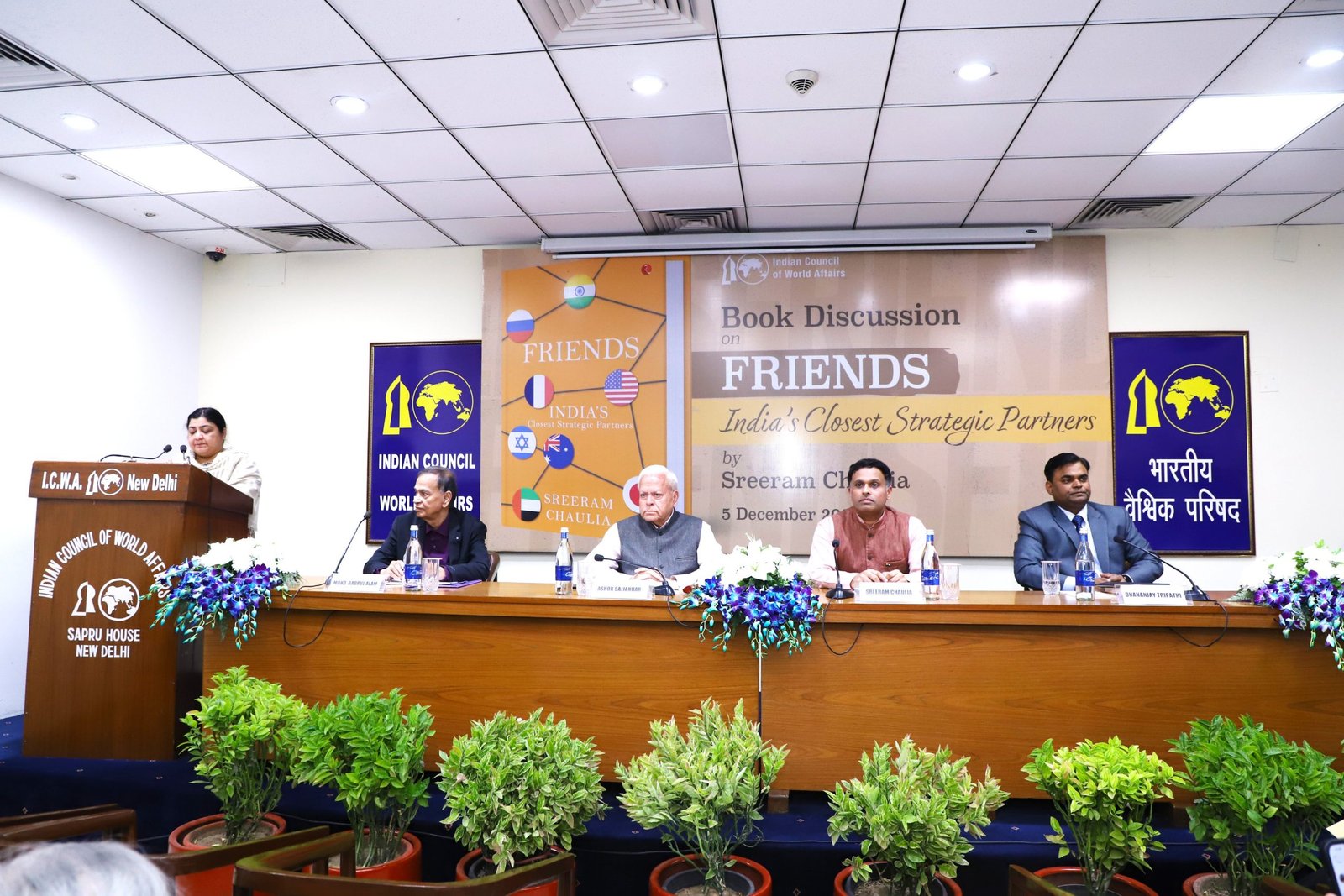
On 5th December, the Indian Council of World Affairs (ICWA) hosted a book discussion on Prof. Sreeram Chaulia’s latest publication, Friends – India’s Closest Strategic Partners. The event was held in New Delhi, with Amb (retd.) Ashok Sajjanhar, former Ambassador of India to Kazakhstan, Sweden and Latvia moderating the discussion. The book focuses on the complexities of India’s foreign relations, highlighting its most trusted allies and strategic partners, and offering readers a detailed exploration of the intricacies shaping India’s global positioning.
The event was opened with welcome remarks by Nutan Kapoor Mahawar, Additional Secretary, ICWA, who eloquently highlighted the nuanced transition in diplomatic language from “friends” to “partners.” She reflected on the beauty of the term “friends,” which encapsulates bonds of trust, camaraderie, and care, contrasting it with the more transactional connotation of “partners.” Drawing on historical and contemporary references, she lauded Prof. Sreeram Chaulia’s book for reviving the essence of friendships in international relations, emphasising how these relationships shape a nation’s identity and strategic posture. She further commended India’s aspiration to be a “Viswamitra”—a friend to all—citing the nation’s adeptness at bridging divides, from engaging with the G7 and BRICS to fostering peace amidst conflicts. Ms. Mahawar underscored the significance of India’s “arc of friendship,” connecting key allies globally, and expressed enthusiasm for the discussion that would explore these vital partnerships.
Prof. Chaulia’s book is a deep dive into India’s relationships with seven major global partners, tracing their evolution from historical contexts to contemporary dynamics. It examines the factors that make these partnerships special, ranging from shared values and interests to economic, political, and strategic alignments. It also sheds light on the challenges of maintaining these ties in an increasingly multipolar world.
Dr. S. Jaishankar, India’s External Affairs Minister, speaking at the book’s release event, remarked, “Who is a friend in world affairs is not an easy question as it appears. Quite apart from convergent interests, there are instincts, trust, solidarity, and respect at play. They explain a lot of the bonding that we often see on the international stage.” His insights underscored the complex balancing act required in India’s foreign policy, especially as the nation rises to a position of prominence on the global stage.
Prof. Mohammed Badrul Alam, a retired professor from the Department of Political Science at Jamia Millia Islamia University, during the discussion, offered a balanced critique of Prof. Sreeram Chaulia’s book. He highlighted the book’s strengths, including its comprehensive analysis of India’s foreign relations and its focus on the strategic depth of bilateral ties with seven key allies. Prof. Alam appreciated the author’s ability to weave historical context with contemporary developments, presenting a nuanced narrative of India’s evolving role on the global stage. At the same time, he constructively pointed out certain areas where the book could have expanded its scope. Prof. Alam praised the author’s scholarly rigour and the book’s contribution to the discourse on India’s foreign policy, calling it a valuable addition to the field of international relations.
Dr. Dhananjay Tripathi, Associate Professor and Chairperson, Department of International Relations, South Asian University commended Prof. Sreeram Chaulia for his exceptional work. During his remarks, Dr. Tripathi lauded the author for thoughtfully highlighting India’s relationships with seven key nations, offering a rich tapestry of historical and contemporary dynamics. He noted that the book skillfully underscores the strategic depth and importance of these partnerships in shaping India’s position as a rising global power.
Dr. Tripathi also appreciated the clarity with which the author articulated the nuances of India’s foreign policy, emphasising the mutual trust, shared interests, and collaborative vision that underpin these alliances. He said, “Prof. Chaulia’s work emerges as a timely contribution to the discourse on India’s role as a rising power, making it a must-read for scholars, policymakers, and anyone interested in India’s place on the global stage.”
Amb Sajjanhar guided the dialogue with his astute observations, emphasising the delicate interplay of trust, capability, and shared objectives that define strategic friendships. He posed an important question regarding the omission of India’s closest neighbours, as well as countries from Latin America and Africa, from the list. Responding to this, Prof. Chaulia explained that his selection was based on India’s official list of strategic partners, from which he identified the seven highlighted in the book.
During the question-and-answer session, an interesting query emerged, addressing a crucial aspect of international relations: “Do these seven countries also consider India as their friend?“ Prof. Sreeram Chaulia responded with confidence, affirming, “I think so. We are very well in their top five list if there is such a list.” His answer highlighted the reciprocal nature of India’s strategic friendships and the mutual regard shared between India and its closest allies. Prof. Chaulia’s assertion reinforced the book’s central theme—India’s friendships are not unilateral but reflective of a dynamic and mutually respectful engagement.
Prof. Chaulia’s book underscores that friendships in diplomacy are shaped by more than just converging interests. Emotional bonds forged through shared experiences, trust built over time, and mutual respect all contribute significantly to the robustness of these relationships. The speakers also highlighted how India balances its historical ties with modern-day strategic needs, carving a unique identity in world affairs.
Leave a Reply